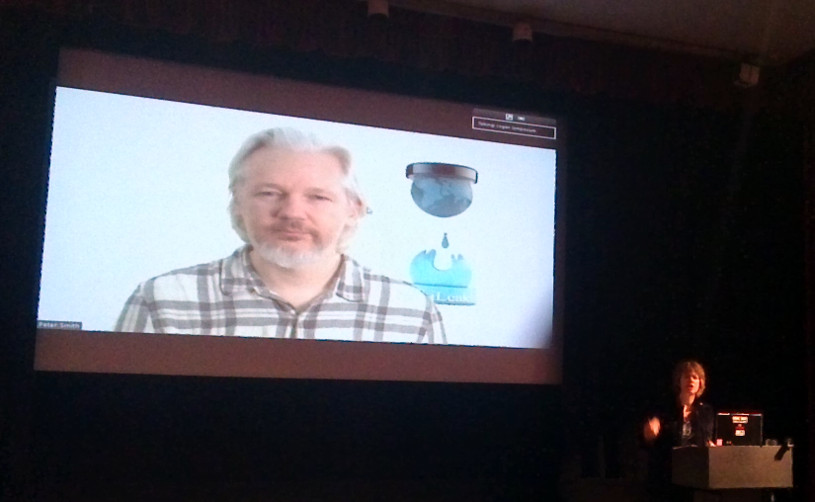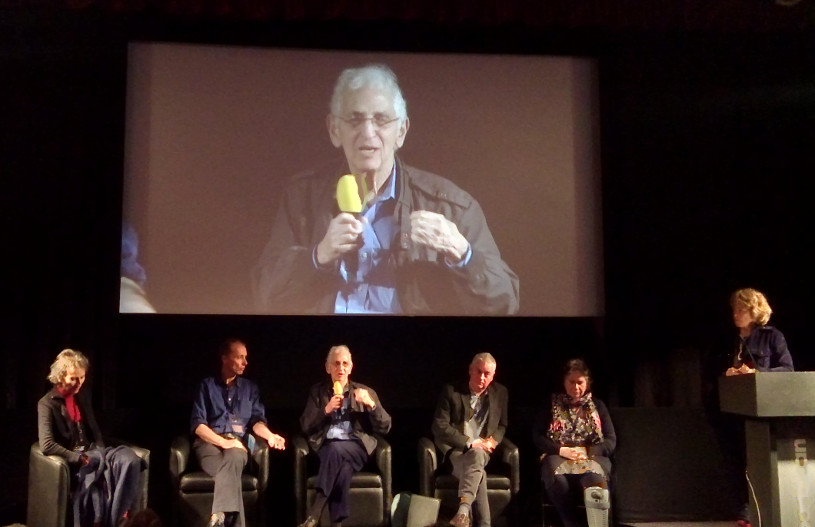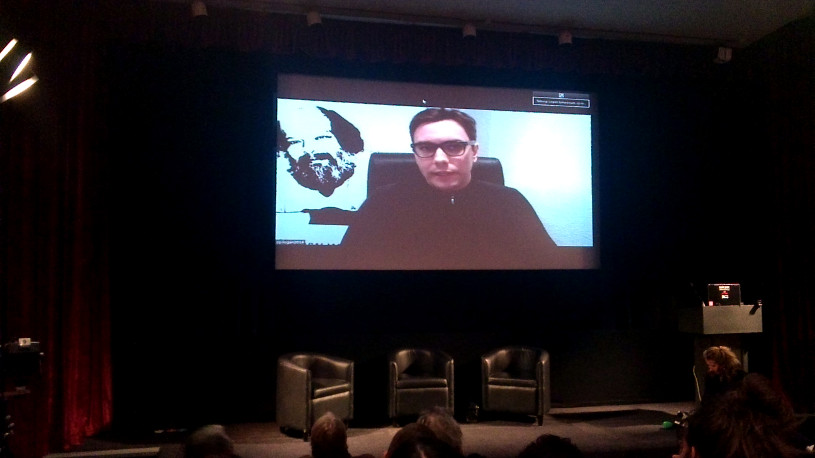On Saturday at the Barbican in London I attended the 2014 Logan symposium — a conference that was intended to bring together key figures in the fight against invasive surveillance and secrecy
. The idea was to build alliances between progressive cyber-activists, hackers and journalists. Speakers included Julian Assange, Jake Applebaum and the surprise guess Daniel Ellsberg.

The event was on the pricey side at 250 quid for the whole 3 day conference or 82 a day with concessions for students. The conference organizers twitter account kindly offered to discount the tickets by a third for me, but that is still quite a lot for many people. Participation might have been wider if the conference was cheaper or maybe even free. Perhaps a cheaper venue than the Barbican Centre may have saved some dough.
That said there was a stellar array of speakers — at least for those interested in anti-surveillance tools, tech activism, or investigatve journalism. And the Barbican Centre’s modernist craziness made for a great backdrop.
The whole event was livestreamed to the web by the conference organizers, the Centre for Investigative Journalism as well as by the NewsPeeks crew. Which probably means that the sessions will appear on the internets at some point. So I shan’t recap much of the content, just some thoughts and reactions I experienced.
Morning Sessions
After navigating our way through a jungle like expanse in the Barbican Centre conservatory we got to the first session of the day — on whistleblowers and how we might support them.
Eileen Chubb gave a moving account of the bullying, social isolation and worse that she and the BUPA 7, underlining just what whistleblowrs risk when they speak out. Eileen is now involved in a campaign called Compassion in Care because the horric abuse of elderly people that she witnessed continues today. She is also campaigning for better legal protection for whistleblowers through Edna’s Law. Bea Edwards of the Government Accountability Project talked through the ways that the UN, multinational corporations and governments punish whistleblowers and how GAP works to protect them.
An important slide. Interpreting the Irish conflict as a colonial not a religious struggle. #LoganCIJ14 pic.twitter.com/5ZAIPE9Cg7
— ciderpunx (@ciderpunx) December 6, 2014The next session was called methods for investigation
and began with an overview of research that the Pat Finucane Centre Anne Cadwallader and Paul O’Connor into systematic human rights abuses by the British State in Northern Ireland. Thinking of the struggle as a colonial and not religious one as in the slide I tweeted makes a huge amount of sense to me. And it was good to learn of the importance of documents to proving the case.
Nicky Hagar gave a great talk on working with whistleblowers, particularly those sources who wish to remain anonymous. His talk included perhaps the most amusing reminder of the day, if you want to keep something secret, don’t tell anyone
. He also talked about how the New Zealand cops had taken all his computers when he investigated government dirty tricks campaigns. Another important reminder: the cops always look at your phone first, then your computers, then the other stuff — notebooks, CDs and so on.
If you want to keep a secret, don’t tell anyone
Karen Spaink talked about the monumental privacy fuckups that characterized the Dutch state’s attempts to introduce electronic patient records, including how she worked with the health authorities and some hacker pals to pen test two hospitals. After the test she had full CRUD access to 1.2 million patient records. Not a great result for the security of the hospital concerned.
The surprise guest and to my mind the most exciting (and indeed persistent!) speaker was Daniel Ellsberg, who leaked the Pentagon Papers in 1971 putting in place a train of events that would lead to the convictions of several White House aides and figured in the impeachment proceedings against President Nixon
. Daniel is a passionate and engaging speaker and had insights about the importance of amassing a large number of documents in order to build a case when whistleblowing.

A little bimble off site.
Being a bit of a slacker, we went for a wander about London, appreciating some cool modernist architecture, eating some sarnies and eventually winding up in a pub up near Old Street for a few hours. I sometimes find the cognitive load of sitting quietly in a room listening whilst people talk at me a bit too high for more than a few consecutive hours. If the event happens again, and I certainly hope it does, perhaps offering some smaller workshops alongside the big name speakers would be something to consider.
Afternoon sessions
The Visions of the future
session that I had skipped out on overran. A lot. It happens. So the Strategies for survival
session was a little more cramped than I would have liked. Nevertheless we managed to cram in talks from former MI5er Annie Machon, Sander Venema, David Ahmad and Jake Applebaum. The last two speakers were of particular interest to me.
David Ahmed had to rush through a somewhat technical talk which looked like, if given an hour at a conference, would be incredibly valuable for journalists or activists needing Adversary resistant computing
. I hadn’t encountered the Subgraph project before, but it certainly looks like one to watch in the future.
Jake Applebaum was insightful. His straightforwardness was refreshing. He called cellphones drone magnets
or tracking devices that can also make calls
and non-free communication software Skype absolute fucking garbage
. He drew the critical connections between the four freedoms of free software and the other freedoms we would like in society and talked about the need to compose our encryption in order to stay safe from repressive governments and corporations and ultimately to be able to excercise free speech.
Jake talked about programs like Tempora and PRISM making 1984 look primitive by comparison. Which made me smile a little given how much he looked like big brother whilst saying it; up on the big screen at the front of the auditorium, like the 1984 Apple ad. You have to get your laughs while you can when talking about the depressing reality of the erosion of fundamental human rights and privacy, I guess.

Assange
The final speaker of the day was Julian Assange, who arrived to tumultuous applause. His talk was a little rambling at first, the gist of it was that islamophobia is rampant in society and that muslims are the scapegoat of the moment. But that the scapegoat could easily be any other group. Say investigative journos. He had a lovely pop at the English class system and how much he despised it, talked a little about wikileaks and his case. And he talked about how quick decision making may be able to wrongfoot arge bureaucratic organizations like NSA. The sex allegations against him of course came up in the questions, Assange wasn’t able to add much to what he has aready said in public.
Wrapping up
Now it was time for some drinks and mingling before watching some "big data poetry". Not being posh, I felt weird at being served drinks by Barbican workers with trays, especially after Assange’s remarks on the ingrained class privilige of English society.
Weird as I felt, I nevertheess grabbed a beer and watched the performance by Michel Banabila and Geert Mul which featured lots of images sampled from public databases. It was definitely not recommended for sufferers of epilepsy given the amount of flashing involved. But enjoyable nonetheless, and a nice way for introverts to end the conference.